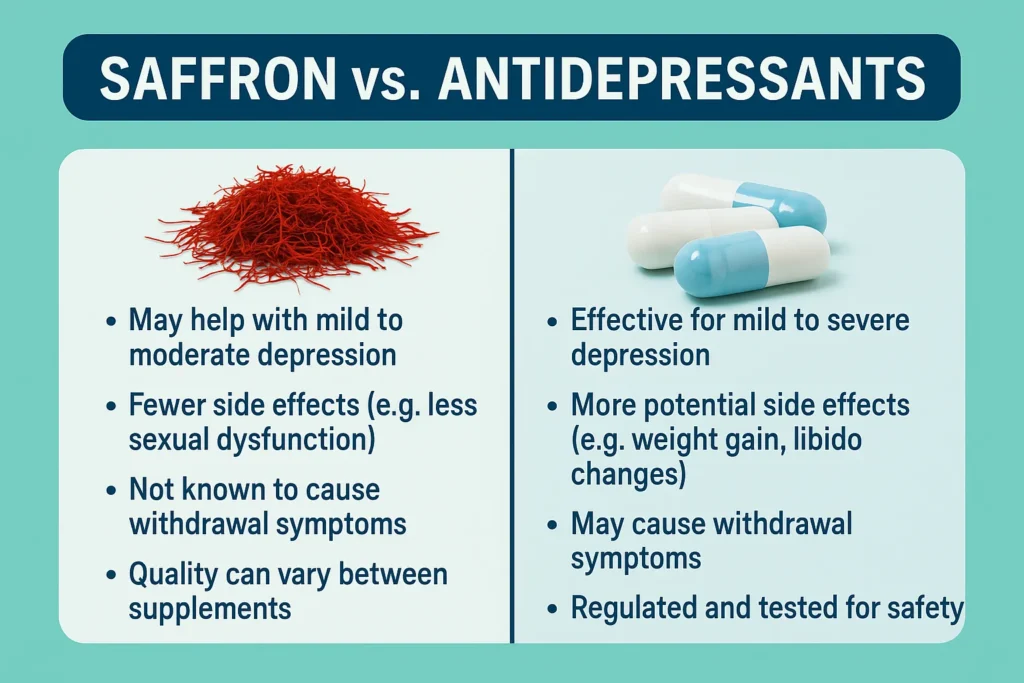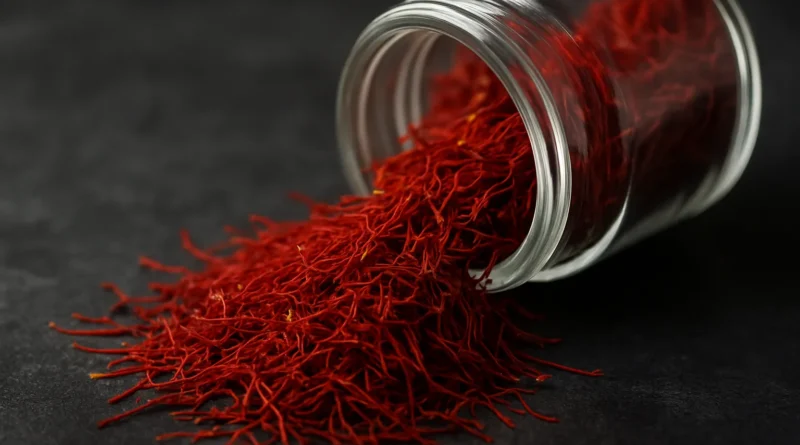Saffron for Depression and Anxiety: What the Research Really Says
In the search for gentler, more natural treatments for depression and anxiety, one surprising candidate keeps showing up in clinical trials: saffron.
Known for its golden hue and steep price tag, saffron is not just a culinary luxury. Studies suggest this ancient spice may have real, measurable effects on mood. Some trials even compare its effects favorably to prescription antidepressants.
But is that claim grounded in science or just another supplement trend?
Let’s take a closer look at what saffron extract really does, how it stacks up against antidepressants, and whether it is worth considering as part of your mental health plan. For a broader look at the connection between body and mind, see Philosophy and Health.
Quick Summary: Does Saffron Work for Depression and Anxiety?
- Saffron extract has been shown in multiple peer-reviewed studies to be as effective as certain SSRIs (like Prozac and imipramine) in mild to moderate depression and generalized anxiety.
- Its active compounds, such as safranal and crocin, are believed to influence serotonin, dopamine, and inflammation.
- It typically shows fewer side effects than traditional antidepressants.
- Most effective doses range between 28 to 30 mg/day of standardized saffron extract.
- Always consult with a healthcare provider before replacing or combining saffron with prescribed medication.
1. What Is Saffron Extract?
Saffron is derived from the stigmas of the Crocus sativus flower. It takes thousands of hand-harvested flowers to produce just a few grams of the spice, which explains its high cost.
The extract used in supplements concentrates bioactive compounds like:
- Safranal (linked to aroma and mood effects)
- Crocin (responsible for saffron’s color and potential antioxidant activity)
- Picrocrocin (contributes to taste)
You’ll commonly find saffron in:
- Capsules (standardized to 2 percent safranal or similar)
- Powdered form
- Liquid tinctures
2. How Does Saffron Affect Mood and Anxiety?
Saffron’s mood-enhancing potential appears to stem from three key effects:
- Boosting neurotransmitters: Saffron may inhibit the reuptake of serotonin, dopamine, and norepinephrine, similar to some antidepressants.
- Anti-inflammatory effects: Chronic inflammation is linked to both depression and anxiety. Saffron’s antioxidant profile may reduce neuroinflammation.
- Neuroprotective benefits: Crocin has been shown to support brain-derived neurotrophic factor (BDNF), involved in emotional regulation.
Together, these mechanisms provide a gentler approach to mental health support without the harsh crash or side effects seen in some pharmaceuticals.
What Crocin and Safranal Actually Do
• Crocin appears to increase brain-derived neurotrophic factor (BDNF), which supports neuron growth and mood regulation.
• Safranal may inhibit the reuptake of serotonin, dopamine, and norepinephrine, similar to the mechanism of some antidepressants.
Together, these compounds reduce oxidative stress and promote neurotransmitter balance, which are both key in managing mood disorders.
3. What the Research Says
Several randomized, double-blind, placebo-controlled trials support saffron’s impact on depression and anxiety:
A 2014 meta-analysis of clinical trials published in Journal of Integrative Medicine found that saffron produced greater effects than placebo and showed comparable efficacy to antidepressants in mild to moderate depression.
PMID: 25384672
A 2005 trial published in the Journal of Ethnopharmacology compared 30 mg/day of saffron extract to 20 mg/day of fluoxetine (Prozac) in adults with mild to moderate depression. The results showed similar improvements in mood, with no significant difference between groups.
PMID: 15707766
A separate 2004 study published in BMC Complementary and Alternative Medicine found saffron to be as effective as 100 mg/day of imipramine, a tricyclic antidepressant, in treating mild to moderate depression—with fewer side effects.
PMID: 15341662
A 2016 clinical trial in Avicenna Journal of Phytomedicine reported that saffron extract significantly reduced symptoms of generalized anxiety disorder over 12 weeks, compared to placebo.
PMID: 27101556
How Saffron Compares to Other Natural Mood Boosters
While saffron shows strong clinical promise, it’s not the only natural option being studied for mood support.
• St. John’s Wort is one of the most researched herbal antidepressants, but it carries a higher risk of drug interactions.
• Ashwagandha is better known for stress and cortisol regulation than direct antidepressant effects.
• Omega-3 fatty acids may benefit depression, especially in people with low baseline intake, but results vary.
Saffron stands out for its dual effects on depression and anxiety, with fewer side effects reported across multiple trials.
4. Is It More Effective Than Antidepressants?
In mild to moderate cases, saffron extract appears to perform on par with common SSRIs in both symptom relief and tolerability.
However, it is important to note:
- Saffron is not recommended for severe depression, panic disorder, or suicidal ideation
- It is not a regulated drug, so quality and potency can vary widely between brands
- Clinical trials have mostly been short-term and conducted on relatively small sample sizes
Where saffron shines is in its side effect profile. Participants report:
- Less sexual dysfunction
- Lower risk of weight gain
- No reported withdrawal symptoms
For many, this makes it a compelling option, especially when supervised by a healthcare professional.
5. Safety, Dosage, and Side Effects
Typical clinical doses range from 28 to 30 mg per day of a standardized extract. Most studies use divided doses (such as 15 mg twice daily).
Side effects are rare, but can include:
- Nausea
- Headache
- Drowsiness
- Allergic skin reactions (uncommon)
High doses of saffron (over 5 grams) can be toxic and are never recommended.
Caution is advised for:
- Pregnant individuals (due to potential uterine stimulation)
- People with bipolar disorder, as it may trigger manic episodes
Always consult your healthcare provider before beginning any new supplement.
6. How to Choose a Quality Supplement
Look for saffron extracts that meet these criteria:
- Standardized to 2 percent safranal or 3.5 percent crocin
- Third-party tested for purity and potency
- Clearly list origin (Crocus sativus, not safflower)
Reputable brands include:
- Life Extension Optimized Saffron
- Pure Encapsulations Saffron Extract
- Double Wood Supplements Saffron
(We’ll soon be reviewing these products directly on Fitsnip.com)

7. Final Thoughts: Should You Try It?
Saffron extract is one of the most studied natural compounds for mood support, and the data is compelling.
For those experiencing mild to moderate depression or anxiety, it could offer a gentler, better-tolerated option than pharmaceuticals. It is not a miracle cure, and it will not replace medical treatment in severe cases. But it is far more than a placebo.
As always, speak with your doctor before making any changes to your treatment plan.
Curious about the mind-body connection? Read Philosophy and Health for more perspective.
FAQ
Is saffron really as effective as antidepressants?
Yes, in some studies, saffron matched fluoxetine and imipramine for treating mild to moderate depression.
Does saffron help with anxiety?
Yes, multiple studies show saffron may ease symptoms of generalized anxiety disorder.
What is the best dosage of saffron for depression or anxiety?
Clinical trials most often use 28 to 30 mg per day, usually split into two doses.
Can you take saffron with antidepressants?
Talk to your doctor first. Saffron may enhance serotonin activity and could interact with SSRIs or SNRIs.
Are there long-term risks to taking saffron?
Current studies are short-term, but side effects appear minimal. However, long-term safety has not been extensively studied.
Is saffron safe for daily use?
Yes, at appropriate doses. Avoid excessive intake or products lacking standardization.
Can I take saffron with prescription antidepressants?
While saffron is natural, it may interact with medications that also influence serotonin, such as SSRIs or SNRIs. Taking both could increase the risk of serotonin syndrome. Always consult a healthcare provider before combining treatments.
Sources
- https://pubmed.ncbi.nlm.nih.gov/16008122/
- https://pubmed.ncbi.nlm.nih.gov/14698508/
- https://pubmed.ncbi.nlm.nih.gov/27687092/
- https://pubmed.ncbi.nlm.nih.gov/25384672/
Written and fact-checked by the Fitsnip editorial team. Last reviewed June 2025.
J.D. Wilson is an Integrative Health Specialist, Certified Meditation Teacher, and author of The Comfort Trap: The Quiet Cost of an Unchallenged Life. He founded Fitsnip.com to translate complex research into practical systems for longevity and mental clarity.
About: https://fitsnip.com/about




